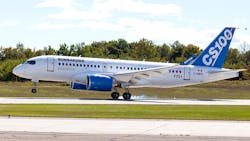Bombardier Cuts Delivery Goal for C Series on Engine Delays
Bombardier Inc. will miss this year’s delivery target for its flagship C Series jet as Canada’s biggest aerospace company grapples with engine delays.
Customers will receive only 20 to 22 of the new aircraft this year, down from an earlier plan for about 30, Bombardier said in a statement Thursday as it reported earnings. The Montreal-based planemaker also announced that an unidentified European client intends to buy at least 31 C Series jets, which would mark the first major sale since April 2016.
The potential order aside, the reduced delivery forecast extends a history of setbacks for a jet that was more than two years late and $2 billion over budget when it entered commercial service last year. Bombardier agreed last month to cede control of the C Series to Airbus SE, which has vowed to cut production costs, win thousands of new orders and move some manufacturing to Alabama to sidestep recently imposed U.S. tariffs on the plane.
Engine supplier Pratt & Whitney, a division of United Technologies Corp., has been working to overcome durability issues affecting the geared turbofan engines that power the C Series, as well as Airbus’s A320neo family of jets. The turbine maker, which reaffirmed its target for 350 to 400 deliveries of the engine this year, is rolling out fixes for the problems.
Bombardier’s widely traded B shares advanced 1.8% to C$2.78 at the close of trading in Toronto on Wednesday. That lifted this year’s gain to 28%, compared with the 4.9% increase of Canada’s benchmark S&P/TSX Composite Index.
Revenue Increases
Bombardier reported an adjusted loss of 1 cent a share for the third quarter, matching the average of analysts’ estimates compiled by Bloomberg. Revenue climbed 2.6% to $3.84 billion, while analysts had projected $4.13 billion.
Shipping fewer-than-expected C Series jets will dent annual sales since plane manufacturers typically collect the bulk of their payments when clients receive their aircraft.
Earnings before interest, taxes and special items this year will be at least $630 million, at the upper end of the previous forecast range, Bombardier said. Full-year sales will be about $16.3 billion while the company spends about $1 billion of free cash flow. The company burned through $495 million in cash in the third quarter, compared with $320 million a year earlier.
Bombardier invested more than $6 billion over the last decade to develop the C Series, a two-airplane family spanning 108 to 160 seats. The larger of the models overlaps with the smallest commercial jets sold by Airbus and Boeing Co.
Trade Battle
The U.S. Commerce Department slapped the C Series with import tariffs totaling about 300% after finding that Bombardier sold planes to Delta Air Lines Inc. at less than fair value after receiving illegal government subsidies in Canada. The decision followed a complaint by Boeing.
The C Series entered commercial service last year at Deutsche Lufthansa AG’s Swiss International unit. The CS100 model has a catalog price of $79.5 million, before the discounts that are customary for aircraft purchases. The CS300 lists at $89.5 million.
Bombardier’s agreement with the European customer covers 31 firm aircraft and options for 30 more. The planemaker expects to cinch the deal by year-end. The firm order would have a list value of about $2.4 billion.
“As Airbus joins the program, and with the C Series continuing to prove itself in service, we expect sales momentum to accelerate quickly,’’ Chief Executive Officer Alain Bellemare said in the statement.
Bombardier had $2.81 billion of available short-term capital resources at the end of September, down from $4.48 billion at the end of last year. The most-recent figure includes $1.84 billion in cash and cash equivalents. Adjusted debt was $9.4 billion.
By Frederic Tomesco
About the Author
Bloomberg
Licensed content from Bloomberg, copyright 2016.
